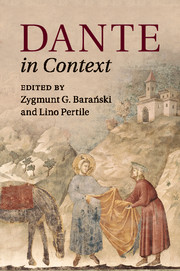Book contents
- Frontmatter
- Dedication
- Contents
- List of illustrations
- List of maps
- Notes on contributors
- Chronology
- Abbreviations and note on translations
- Introduction
- Part I Politics and society
- Part II Intellectual traditions
- Part III Linguistic and literary cultures
- Part IV Visual and performative culture
- 24 Illumination, painting, and sculpture
- 25 Architecture and urban space
- 26 Music
- Part V Dante: life, works, and reception
- Further reading
- Index
26 - Music
from Part IV - Visual and performative culture
Published online by Cambridge University Press: 05 October 2015
- Frontmatter
- Dedication
- Contents
- List of illustrations
- List of maps
- Notes on contributors
- Chronology
- Abbreviations and note on translations
- Introduction
- Part I Politics and society
- Part II Intellectual traditions
- Part III Linguistic and literary cultures
- Part IV Visual and performative culture
- 24 Illumination, painting, and sculpture
- 25 Architecture and urban space
- 26 Music
- Part V Dante: life, works, and reception
- Further reading
- Index
Summary
By the late Duecento and early Trecento, music had acquired nearly all the characteristics that we associate with the art form today. Professional musicians coexisted with amateur performers and composers. A well-established and efficient system of notation and means of transmission had been developed. Scholars had written textbooks documenting both the scientific and, to a lesser extent, the artistic fundamentals of music. Music existed to accompany, document, and amplify nearly every aspect of life, from gleeful dancing to solemn ceremony, and from sacred worship to bawdy celebration. Many uses for music and a variety of musical expressions would have been known to Dante – and indeed his writings give ample evidence of his rich learning in this art – but the specific forms of musical expression and the vocabulary used to discuss music, its composition, its study, and its performance are quite foreign today. In addition, apprehending connections between Dante and music is complex since the musical world of Italy at the time he was writing is still little understood. Most studies of Italian music or medieval music begin their focus on the peninsula only after the arrival of the Black Death towards the middle of the Trecento, up to this point centring their discussions of European music history on French traditions.
This chapter provides a background to the music and ways of conceptualizing music that would have been known towards the end of the thirteenth century and into the mid-fourteenth century. It does not focus exclusively on new compositions that were written during the lifetime of Dante and his early readers in and around Florence, but also covers the older music and older musical ideals that were still in currency in the early fourteenth century.
The most important and pervasive musical tradition was also the oldest. Plainsong, or Gregorian chant as it is called today, was a set of codified relationships between music and words sung at the daily Mass and, especially in monasteries and at large churches, at the eight other ceremonies called the hours of the Office.
- Type
- Chapter
- Information
- Dante in Context , pp. 448 - 458Publisher: Cambridge University PressPrint publication year: 2015



